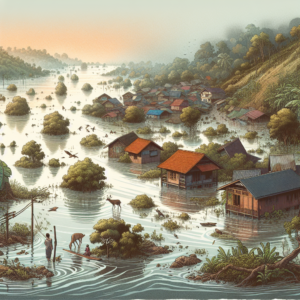Harmony in Creation: Exploring the Intersection of Biblical Wisdom and the Laws of Nature
In an age marked by rapid technological advancement and environmental upheaval, the quest for harmony between human existence and the natural world has never been more urgent. The principles found within biblical wisdom provide timeless guidance that resonates profoundly with the laws of nature. By exploring this intersection, we uncover a path that encourages not only coexistence but also a flourishing relationship with the earth and all its inhabitants.
The Biblical Perspective on Creation
From the very beginning of the Bible, creation is depicted as an intentional act of divine artistry. The Book of Genesis describes how God created the world in six days, declaring each aspect of His creation to be "good." This divine affirmation of the natural world underscores the inherent value of all creation. It hints at a profound interconnectedness where everything has a purpose and role within the grand tapestry of life.
The biblical narrative presents humanity as stewards of God’s creation, entrusted with the responsibility to care for and nurture the earth. In Genesis 2:15, we read that God placed Adam in the Garden of Eden "to work it and take care of it." This invitation to stewardship is not a call to dominate or exploit, but rather a call to cultivate a harmonious relationship with the earth—an echo of the natural cycles and interdependencies inherent in creation.
The Laws of Nature: A Testament to Order
As we look to the natural world, we observe an astonishing interplay of laws that govern life. The principles of ecology, balance, and sustainability echo the biblical call to stewardship. Ecosystems flourish on cooperation, where every organism, from the smallest microbe to the largest predator, plays a critical role in maintaining balance. This interconnectedness is not merely a scientific observation; it reflects a deeper truth about the purpose and design of creation.
Indeed, the laws of nature reveal an intricate system of checks and balances that aligns with biblical wisdom. For example, the principle of reciprocity—where organisms provide resources for one another—mirrors the Biblical concept of community and mutual support. Just as the Bible encourages us to bear one another’s burdens (Galatians 6:2), nature invites us to recognize our place within the web of life, emphasizing that our actions resonate throughout the ecosystem.
Learning from Creation: Wisdom for Today
As we explore the teachings of the Bible alongside the lessons of nature, several powerful insights emerge:
-
Interconnectedness: Both the Bible and the natural world teach us that everything is connected. This understanding encourages a mindset of respect for all forms of life, fostering compassion and empathy towards fellow creatures.
-
Stewardship: Recognizing our role as caretakers of the earth encourages responsible action. It urges us to make choices that protect the environment, promote biodiversity, and ensure the wellbeing of future generations.
-
Sustainability: The harmony found in nature advocates for sustainable practices that conserve resources rather than deplete them. By aligning our lifestyle with the rhythms of the natural world, we promote both ecological health and spiritual fulfillment.
-
Hope: The narrative of creation offers hope—reminding us that healing and restoration are possible. Just as ecosystems can recover from disturbance, so too can humanity nurture a thriving world, grounded in love and gratitude for the incredible creation around us.
Moving Forward: A Call to Action
In this pivotal moment in history, we are invited to reflect on our relationship with both biblical teachings and the natural world. By adhering to the principles of stewardship, interconnectedness, and sustainability, we can foster a deeper appreciation for the harmony in creation.
Community initiatives—whether local clean-ups, conservation efforts, or educational programs—demonstrate how collective action can embody this harmony. Likewise, individual choices, such as reducing waste, supporting sustainable agriculture, and advocating for environmental justice, contribute to a larger movement towards restoration.
As we embrace the wisdom embedded in both scripture and nature, we are empowered to partake in the sacred work of reconciliation—both within ourselves and with the world around us. The vibrant beauty of creation beckons us, inviting us to respond with gratitude, action, and a commitment to nurturing the delicate balance that sustains us all.
In the words of Psalm 24:1, "The earth is the Lord’s, and everything in it." Let us honor this truth as we seek to cultivate harmony in creation, allowing biblical wisdom to illuminate our path towards a future where humanity and nature thrive together in unity.
Explore and dig up answers yourself with our BGodInspired Bible Tools! Be careful – each interaction is like a new treasure hunt… you can get lost for hours 🙂


